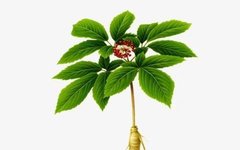In ancient times, there were numerous records regarding the various effects of ginseng. Shennong Bencao Jing promotes that it “mainly tonifies the five organs, calms the spirit, stabilizes the soul, stops palpitations, eliminates evil qi, brightens the eyes, and enhances intelligence.” The Ming Dynasty’s Li Shizhen’s Bencao Gangmu further praises ginseng for “treating all deficiencies in men and women.”

1. Traditional Medicinal Value of Ginseng
[Properties] Sweet, slightly bitter; warm, neutral.
[Meridians Entered] Spleen (Pi), Lung (Fei), Heart (Xin).
[Functions] Greatly tonifies Yuan Qi, restores pulse and stabilizes collapse, tonifies spleen and benefits lung, generates fluids and calms the spirit, treats body deficiency leading to collapse, cold limbs with weak pulse, spleen deficiency with poor appetite, lung deficiency with cough and wheezing, fluid damage with thirst, internal heat with thirst, prolonged illness with weakness, palpitations and insomnia, impotence and cold uterus, heart failure, and cardiogenic shock.
2. Analysis of Traditional Medicinal Effects of Ginseng
Greatly Tonifies Yuan Qi: Ginseng alone can greatly tonify Yuan Qi, strengthen the heart, and rescue from collapse, as seen in the formula Dushen Decoction. When used for kidney deficiency and impotence, it is often combined with deer antler (Lu Rong) and psoralea (Bu Guo Zhi) for kidney tonification and yang enhancement.
Calms the Spirit and Enhances Intelligence: Ginseng is used for anxiety and insomnia caused by qi and blood deficiency, often combined with blood-nourishing and calming herbs like longan flesh (Long Yan Rou) and sour jujube seed (Suan Zao Ren).
Restores Pulse and Stabilizes Collapse: Ginseng is used for severe blood loss, excessive vomiting and diarrhea, and all diseases caused by extreme deficiency of Yuan Qi leading to qi deficiency and collapse, shortness of breath, and extreme fatigue, which can be taken in large doses as a concentrated decoction.
Tonifies Spleen and Benefits Qi: Ginseng is used for insufficient spleen qi, leading to fatigue, poor appetite, abdominal distension, and loose stools, often combined with Bai Zhu (White Atractylodes) and Fu Ling (Poria) to strengthen the spleen and benefit the stomach.
Tonifies Lung Qi: Ginseng is used to treat lung qi deficiency leading to shortness of breath, fatigue, and spontaneous sweating, often combined with gecko (He Jie) and walnut (Hu Tao) in formulas like Ginseng Gecko Powder and Ginseng Walnut Decoction.
Benefits Qi and Generates Fluids: Ginseng is used to treat heat diseases with damage to both qi and fluids, leading to body heat, thirst, excessive sweating, and weak pulse, often combined with gypsum (Shi Gao) and Anemarrhena (Zhi Mu) to clear heat, benefit qi, generate fluids, and relieve thirst.
 Ginseng is one of the precious medicinal materials, classified as a superior herb in Shennong Bencao Jing. Over two thousand years ago, people discovered that ginseng has the effects of “greatly tonifying Yuan Qi, calming the spirit, enhancing intelligence, generating fluids, supporting the body, and prolonging life.” The Tang Dynasty was the peak period for the use of ginseng in China, with records stating: “It can be made into soup, honey pills, or powder, all of which have remarkable effects,” and the tonifying function of ginseng has been widely recognized.
Ginseng is one of the precious medicinal materials, classified as a superior herb in Shennong Bencao Jing. Over two thousand years ago, people discovered that ginseng has the effects of “greatly tonifying Yuan Qi, calming the spirit, enhancing intelligence, generating fluids, supporting the body, and prolonging life.” The Tang Dynasty was the peak period for the use of ginseng in China, with records stating: “It can be made into soup, honey pills, or powder, all of which have remarkable effects,” and the tonifying function of ginseng has been widely recognized.
Modern medical research has proven that ginseng not only has health-boosting properties but also has effects in preventing tumors, anti-aging, anti-arrhythmia, inhibiting cell apoptosis, lowering blood sugar and lipids, improving memory, enhancing sexual function, boosting immunity, and detoxifying, making it increasingly popular among people.

1. Regulates the Central Nervous System
Ginseng can regulate the central nervous system, improving the balance between excitation and inhibition in the brain; it can enhance both mental and physical labor capacity and has anti-fatigue effects. Ginseng strengthens the excitation process of the cerebral cortex while also enhancing the inhibition process. The main active components are ginsenosides Rg1 and Rb1, which are related to promoting the synthesis of proteins and RNA in brain tissue.
2. Enhances Memory
The effective components in ginseng that enhance memory are ginsenosides, mainly ginsenosides Re, Rb1, and Rg1. Experiments have shown that ginsenosides promote the learning and memory processes in normal rats and significantly improve memory impairment caused by electric shock.
3. Improves Cardiac Function
Ginseng can increase myocardial contractility, slow the heart rate, and increase cardiac output and coronary blood flow, providing protection against myocardial ischemia and arrhythmia. It has a significant impact on cardiac function, cardiovascular health, and blood flow. Ginseng exhibits a notable anti-hypoxia effect and can effectively regulate sinus rhythm disturbances. Ginsenosides can reduce blood viscosity, lower sedimentation rates, inhibit platelet aggregation, prevent coagulation, and thrombus formation, and accelerate lipid metabolism, significantly lowering high cholesterol levels. Low doses of ginseng can mildly raise blood pressure in anesthetized animals, while high doses can lower it. Experimental evidence shows that ginseng enhances cardiac function in animals and improves myocardial weakness during ventricular fibrillation.
4. Lowers Blood Sugar
Ginseng contains ginsenosides and ginseng polysaccharides. In particular, ginsenosides Rb2 and Re have significant blood sugar-lowering effects. Additionally, ginseng polysaccharides and ginseng glycopeptides are also components that lower blood sugar.
The mechanism of blood sugar reduction by ginseng polysaccharides includes: first, reducing liver glycogen. Ginseng polysaccharides can lower liver glycogen content while increasing adenylate cyclase activity and cAMP levels; second, promoting insulin secretion. Ginseng polysaccharides can stimulate insulin release and promote aerobic oxidation processes in the liver and tissue cells.
5. Enhances Immune Function
Ginsenosides and ginseng polysaccharides are the active components that regulate immune function, enhancing immunity not only in healthy individuals but also in those with weakened immune systems. Clinical observations confirm that ginseng has certain therapeutic effects on malignant tumors, significantly increasing white blood cell counts. Taking ginseng during radiotherapy and chemotherapy can reduce the toxic side effects of these treatments, accelerate the repair of damaged tissues, and prevent leukopenia.
Ginseng enhances endocrine function, with ginsenosides promoting and enhancing pituitary-adrenal cortex function and gonadal function.
Ginseng promotes the synthesis of DNA, RNA, proteins, and lipids in the bone marrow, stimulates mitosis in the bone marrow, and enhances hematopoietic function, increasing peripheral red blood cells, hemoglobin, white blood cells, and platelets. It can be used for anemia and bone marrow suppression after chemotherapy.
Ginsenosides and ginseng polysaccharides stimulate both humoral and cellular immunity, increasing the levels of immunoglobulins in the serum, thereby reducing the incidence of age-related diseases.

6. Anti-Tumor Effects
Ginsenosides, ginseng polysaccharides, ginseng olefins, ginseng alkynes, and volatile oils in ginseng all have certain inhibitory effects on tumors. Ginsenosides can inhibit the proliferation of cancer cells, suppress the synthesis of cancer cell DNA and RNA, and have a significant effect on inhibiting tumor metastasis and growth; ginseng polysaccharides have cytotoxic effects on human laryngeal cancer cells and human lung cancer cells, causing tumor cell necrosis; ginseng olefins and volatile oils exhibit strong anti-tumor activity, inhibiting gastric cancer and ascitic cancer.
7. Anti-Aging Effects
Ginseng contains various antioxidants, including ginsenosides, ginseng polyacetylenes, and ginseng diol saponins. These compounds have anti-lipid peroxidation effects, which are the basis for their anti-aging properties.
8. Anti-Fatigue Effects
Ginseng has a significant impact on the functional activities of the cerebral cortex, enhancing both excitation and inhibition processes in a short time. Ginseng can increase the flexibility of the excitation process and reduce the fatigue of the excitation process, making the body less prone to fatigue while enhancing memory and discernment.
9. Anti-Stress Effects
The anti-stress effects of ginseng are fundamentally different from those of stimulants and are related to ginseng’s influence on the nervous, endocrine, immune, and metabolic systems. Ginseng can enhance the body’s resistance to various harmful stimuli, increasing the secretion of adrenal cortex hormones and significantly raising plasma adrenal cortex hormone concentrations.
10. Enhances Liver Detoxification Function
Ginsenosides promote the liver’s detoxification, excretion, metabolism, and immune functions, enhancing the body’s ability to metabolize many drugs, inducing liver cell microsomes, and having a bidirectional regulatory effect on the activity of liver succinate dehydrogenase and malate dehydrogenase.
11. The Bidirectionality of Ginseng’s Effects
The various active components of ginseng result in bidirectional pharmacological effects. Ginseng can enhance both the excitation and inhibition processes of the central nervous system. Generally, ginseng lowers blood pressure in anesthetized animals, but it can significantly raise blood pressure in cases of shock due to blood loss.
Ginseng has no significant effect on normal blood sugar but can lower it in those with high blood sugar, while it can raise blood sugar in those with low blood sugar; ginseng can lower liver glycogen in those with normal diets but can promote glycogen synthesis in those who are starving. It lowers blood sugar in animals with high blood sugar induced by adrenaline; in diabetic patients, it not only improves symptoms but also has a slight blood sugar-lowering effect and works synergistically with insulin.
Ginseng can enhance the body’s responsiveness. When the body is subjected to prolonged stress, ginseng can prevent the pituitary-adrenal cortex system from functional failure; if the body has already entered a state of failure, ginseng can accelerate the recovery of the pituitary-adrenal cortex system, demonstrating an “adaptogen-like” effect.
Ginseng has direct effects on myocardial and vascular function. Generally, it excites at low doses and inhibits at high doses. It also has anti-allergic shock and cardiotonic effects.

Long-term use of small amounts can enhance the function of the reticuloendothelial system; excessive doses can have the opposite effect. When the body is functioning normally, ginseng only exhibits strengthening effects without affecting normal behavior, but once the body is damaged or its function is impaired, ginseng demonstrates a significant ability to enhance the body’s tolerance to adverse factors and recovery capacity.
Understanding and recognizing the characteristics of ginseng’s effects can deepen the understanding of its complexity and outstanding efficacy, and it can also be recognized that taking ginseng does not necessarily have to be during illness; regular use and consumption can be more beneficial to human health.

Busy with no end in sight,
Energy is about to be depleted,
Where to replenish energy?
Look here ☟


